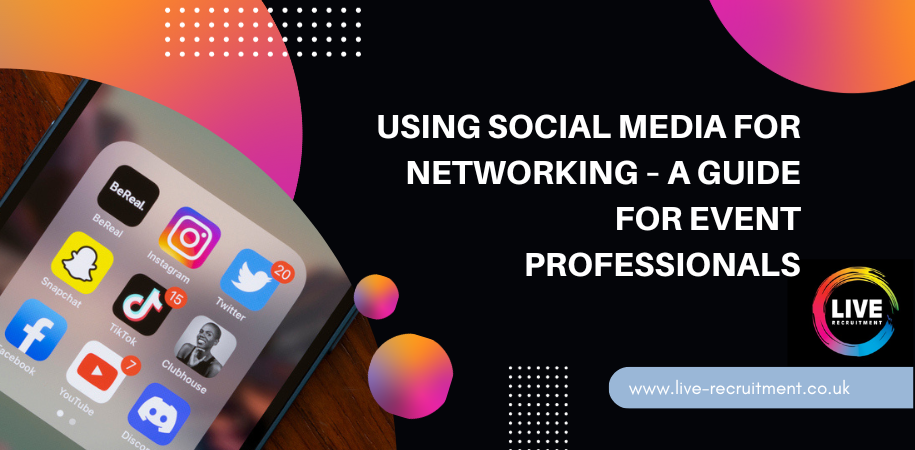In the digital age, social media has transformed the way we communicate and connect. It's not just a platform for sharing cat memes and photos of your brunch; it's a powerful tool for networking, especially for event professionals.
Whether you're an event planner, manager, marketer, or supplier, leveraging social media can enhance your career and open doors to exciting opportunities. In this guide, we'll explore how to use social media effectively for networking in the dynamic world of event management.
Separate personal and professional
Before you start using social media for professional purposes, you need to think about whether you will use your personal accounts or create new dedicated accounts. Choosing to put your online presence out there means that it might attract some judgement. If you are prone to oversharing on social media, you might be better off keeping the two separate.
Many people will choose to make their personal profiles private once they have started their professional profiles. This is a good idea, as it will help to direct individuals towards the public profiles.
This advice is only relevant to platforms where you might have a personal presence. For example, Instagram and Facebook. On LinkedIn and X, you are far more likely to be there for professional reasons.
Choose the right platforms
There's no shortage of social media platforms, but not all are equally suited for networking in the event industry. Here are some popular platforms and how they can benefit event professionals:
LinkedIn: Often referred to as the "professional network," LinkedIn is a must for event professionals. Create a polished profile, connect with industry peers, and join relevant groups and discussions.
X (Formerly Twitter) X is an excellent platform for real-time engagement. Follow industry experts, event organisations, and hashtags like #EventProfs to stay updated and participate in discussions.
Instagram: Use Instagram to showcase your event portfolio. High-quality visuals can attract potential clients and collaborators. Utilise event-specific hashtags to reach a broader audience.
Facebook: Join event-related groups and pages, and actively participate in discussions. Facebook also offers event creation and promotion features, which can be beneficial.
YouTube: If you produce video content or event highlights, YouTube is an ideal platform for sharing your work and building a subscriber base.
A word of warning; you don’t have to be active on every single platform. You can pick and choose the ones that work best for you and your needs. If you spread yourself too thin, you might find that your presence is ineffective and counterproductive.
Craft an engaging profile
Your social media profile is your digital business card. Optimise it to make a strong first impression:
Use a professional headshot or logo as your profile picture.
Write a compelling bio that highlights your expertise and passion for events.
Include relevant keywords in your profile summary to improve discoverability.
Add a link to your website or portfolio so hiring managers can learn more.
You also need to make sure you have a clear point of contact and then check the messages regularly. There’s nothing worse than discovering you’ve missed messages from hiring managers 6 months after they have been sent.
Build a strategic network
Growing your network on social media involves more than just accumulating connections. Focus on quality over quantity:
Connect with professionals who share your interests and goals.
Stop seeing your colleagues and contemporaries as competition and start seeing them as allies.
Personalise connection requests with a brief message explaining why you'd like to connect.
Engage with your connections' posts and updates. Comment thoughtfully and share valuable content.
Share valuable content
Establish yourself as an industry thought leader by sharing content that adds value:
Share articles, infographics, and videos related to event management.
Create and share your original content, such as blog posts, event success stories, or tips and tricks.
Use storytelling techniques to make your posts more engaging and relatable.
If you’re not sure if you’re sharing the right things, take a step back and think about your purpose. Are you trying to connect with other professionals, are you trying to showcase your work, or are you simply trying to learn from others? Having a clear purpose on social media will help you to make sure the content you share is useful and relevant.
Participate in industry conversations
Networking on social media isn't a one-way street. You shouldn’t just be broadcasting your own message; you should also be engaging with others and being part of the conversation. This can be easier said than done, but you can start small and build up. Try the following:
Join relevant groups and forums where event professionals gather.
Participate in Twitter chats and LinkedIn discussions.
Share your insights and expertise when responding to comments and questions.
Attend virtual events and webinars
Many industry events have moved online, making it easier to attend from anywhere in the world. Social media can be a powerful tool for connecting with speakers and attendees:
Follow event hashtags to stay updated on live discussions.
Engage with speakers and attendees by commenting and sharing their insights.
Connect with them on social media after the event to continue the conversation.
Be consistent and authentic
Consistency is key to maintaining an active online presence. Be genuine and authentic in your interactions:
Post regularly but don't overdo it. Quality trumps quantity.
Be yourself; authenticity builds trust and fosters real connections.
A word of warning on using AI to generate your online presence. While it might save time, it will reduce the authenticity of your voice. When people meet you, there will be a clear disconnect between who you are online and who you are in person, so your efforts could be wasted if you aren’t authentic online.
Closing thoughts
In conclusion, social media is a valuable tool for event professionals looking to expand their network, stay updated, and showcase their expertise. By choosing the right platforms, crafting a compelling profile, engaging authentically, and consistently sharing valuable content, you can harness the power of social media to advance your career in the exciting world of event management. So, go ahead, connect, and let your professional journey in the event industry thrive in the digital age.


